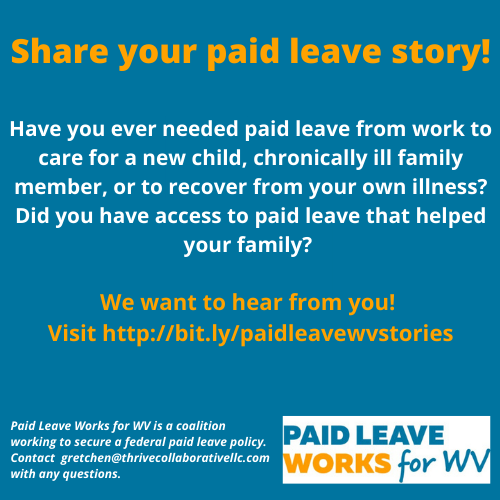The American Rescue Plan Act (ARPA) will allocate more than $1.355 billion in federal relief funds to the state of West Virginia to address the ongoing economic and health impacts of the pandemic. Recently, members of legislative leadership have called for a special session to fulfill the mandate set forth in House Bill 2014, which provides for legislative oversight for any sum of federal monies exceeding $150 million issued during a state of emergency. HB 2014 was introduced and passed largely because many lawmakers felt there was a lack of broad input on spending of the CARES Act’s Coronavirus Relief Funds throughout the first year of the pandemic.
Legislative oversight and allocation of ARPA funds could be a positive force for West Virginia communities, but it must be combined with direct input from those most impacted by the pandemic-driven recession.
To that end, it is critical that state lawmakers deliberately create the space necessary for their constituents to share what they most need to move forward in a post-pandemic world. While electronic platforms are a good start, it is important to recognize that socially distanced in-person meetings are possible and necessary to ensure that low-income individuals, people without internet access, and Black and brown communities are heard clearly before any decisions about how to appropriate ARPA funds are made.
Read Seth’s full blog post here.
Read our recent fast facts sheet on best practices for local and state prioritization of ARPA funds here.
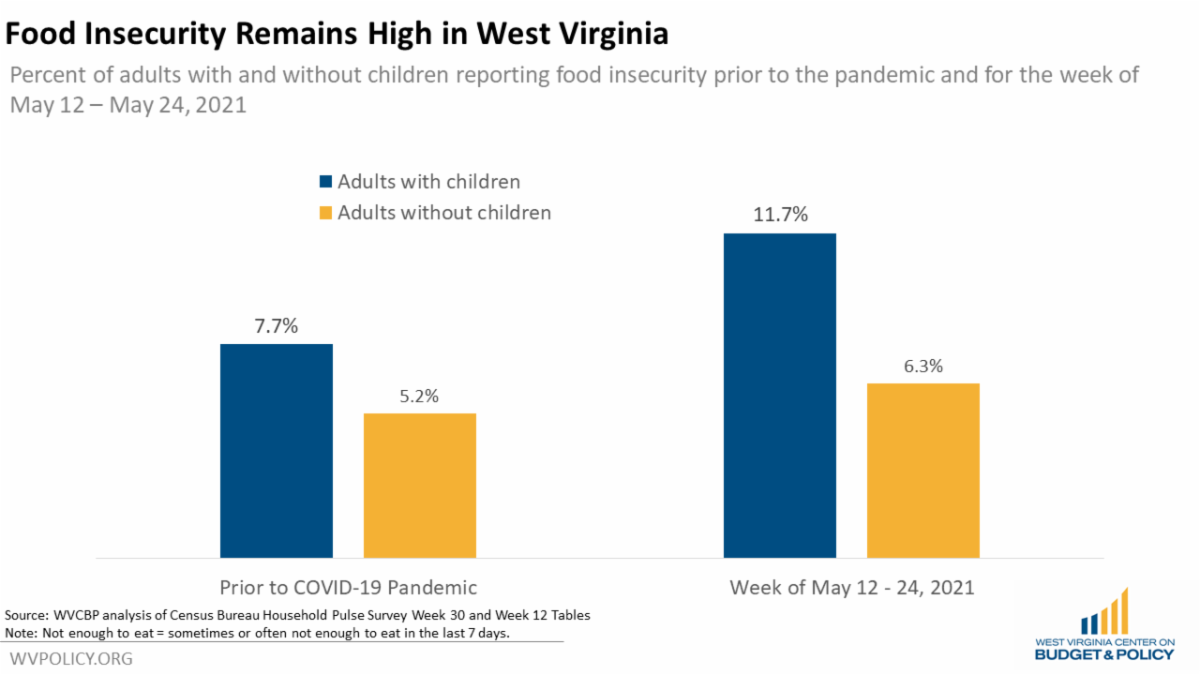
The Supplemental Nutrition Assistance Program (SNAP) provides crucial nutrition assistance to low-income individuals and households whose incomes are at or below 130 percent of the Federal Poverty Level. Along with unemployment insurance, SNAP is the most responsive aid program providing assistance during economic downturns. SNAP is fully federally funded and is administered by states.
Most unemployed adults who do not have children living in the home are limited to three months of SNAP benefits in a three-year period unless they can document that they are working at least 80 hours per month or participating in a qualifying workfare or job training program. States have the flexibility to seek waivers from this time limit in areas with high unemployment where qualifying jobs are scarce.
While the stated benefits of time limits — getting people into employment — are not proven to work, time limits do have significant impacts in reducing SNAP program participation and by extension increasing hunger as household incomes stay flat. This is unsurprising because taking food benefits away from low-income individuals does nothing to address the underlying barriers they face to employment.
As a result of state legislation passed in 2018 (HB 4001), West Virginia enforced SNAP time limits for adults without children in the home in 36 of the state’s 55 counties, even as many of those counties were eligible for federal waivers due to higher-than-average unemployment. In March 2020, with the passage of the Families First Coronavirus Response Act, the three-month time limit on SNAP benefits was suspended for the duration of the public health emergency, which is still ongoing as the economic impacts of the pandemic continue. This provision has likely helped West Virginians who would not normally be eligible for the program access it.
Statewide and national data has made clear that SNAP is critical to food security and improved nutritional outcomes. Additionally, efforts to condition food benefits on the ability to secure work have been proven to do little to increase employment among populations who face significant barriers to work. State lawmakers should heed the lessons learned from the pandemic and available research and repeal HB 4001.
Read Kelly’s full blog post.

A recent op-ed by WVCBP senior policy analyst Sean O’Leary explains how Governor Justice’s recent decisions to forgo enhanced unemployment benefits and support SB 272 work in conjunction to harm West Virginia workers. Excerpt below:
Over the past year, the pandemic and our nation’s response have highlighted some of the flaws in our antiquated federal-state unemployment insurance system.
The CARES Act addressed some of these well-recognized problems, particularly through the Pandemic Unemployment Assistance (PUA) program, which provides unemployment benefits to people who do not normally qualify for traditional unemployment insurance.
About 8,000 workers in West Virginia are claiming pandemic unemployment benefits, and as many as 40,000 claimed those benefits during the height of the pandemic. None of these workers would have qualified for any unemployment benefits in the absence of this program, making it a lifeline for thousands of households in West Virginia.
To date, the program has driven $163 million into West Virginia, helping unemployed workers pay bills, put food on the table and support businesses as we emerge from the pandemic. The success of the pandemic unemployment program during this unprecedented crisis shows that providing jobless benefits to unemployed independent contractors and the self-employed is a sensible and effective policy.
But instead of learning from the program and acknowledging the hole in the existing unemployment insurance system for independent contractors, Justice is ending the program earlier than is required. Rather than recognizing the need for access to unemployment benefits for independent contractors, Justice has heavily implied that the recipients are lazy and scamming the system to avoid going back to work, despite no evidence to support his claims.
At the same time, he has signed legislation [SB 272] to make it easier to classify workers as independent contractors and strip them of access to unemployment benefits.
When it comes time to take away basic labor protections, independent contractors are described as job creators, entrepreneurs and the future of work. But when these exact same workers need help and support, suddenly they transform into lazy scammers who are cheating the system.
It’s hypocrisy, but there is a common thread. By pushing to make it easier for businesses to misclassify their employees as independent contractors, and by claiming independent contractors are lazy for collecting unemployment benefits, the safety net is weakened, labor protections are worn down and West Virginia’s workers are left — once again — with the short end of the stick.
Read Sean’s full op-ed.

The WV Criminal Law Reform Coalition has identified five major project areas that WV cities and counties can target American Rescue Plan Act (ARPA) funds toward in the effort to improve public safety and reduce reliance on incarceration.
The coalition advises that ARPA funds be used to:
– Expand access to stable and affordable housing;
– Support victims of crime and address intergenerational and community trauma;
– Reduce reliance on criminal legal fees and base fines on ability to pay;
– Create or expand crisis intervention services for behavioral & mental health calls; and
– Integrate social workers into local police departments.
We are currently in the process of sending letters to city and county officials to share this guidance and invite them to engage in further discussion with us about these ideas. Through the targeted uses mentioned above, local governments can work toward reducing violence and promoting safety and long-term well-being of all residents.
Read the full letter.
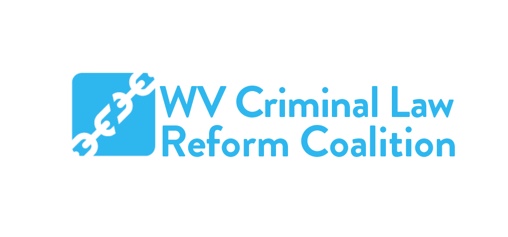
President Biden recently announced the American Families Plan (AFP) proposal, featuring major investments in K-12 education, child care, higher education, health care, and paid leave, as well as extended tax cuts for families and workers with children.
The AFP also includes revenue-raising proposals that would affect only very high-income taxpayers. And while the benefits of the AFP would be broadly shared, these tax increases would impact only .01 percent of West Virginia taxpayers — the smallest share in the nation — and work toward a tax system that raises more adequate revenue from those who have seen disproportionate income wealth gains in recent decades.
Join us in urging Senators Manchin and Capito to support the AFP and do their part to invest in West Virginia’s economic recovery and fund our future by sending them a letter here.
Find details of how the AFP benefits West Virginia children, workers, families, uninsured individuals, and veterans in our recent Twitter thread.
Learn more about how the AFP would serve as equitable tax reform in Sean’s full blog post.

Counties and municipalities in West Virginia will be receiving $677 million in the coming months through the American Rescue Plan Act. What could this mean for advancing community food security across our state? Join the Food for All coalition’s partner, the WVU Food Justice Lab, as they present preliminary research about ARPA and ways to build local advocacy networks to advance the right to healthy food in the Mountain State.
The Food Justice Lab will be offering two informational sessions:
The webinars are free of charge. Please register in advance so that the presenters have an idea of what the audience for each session will look like. You can find registration here.
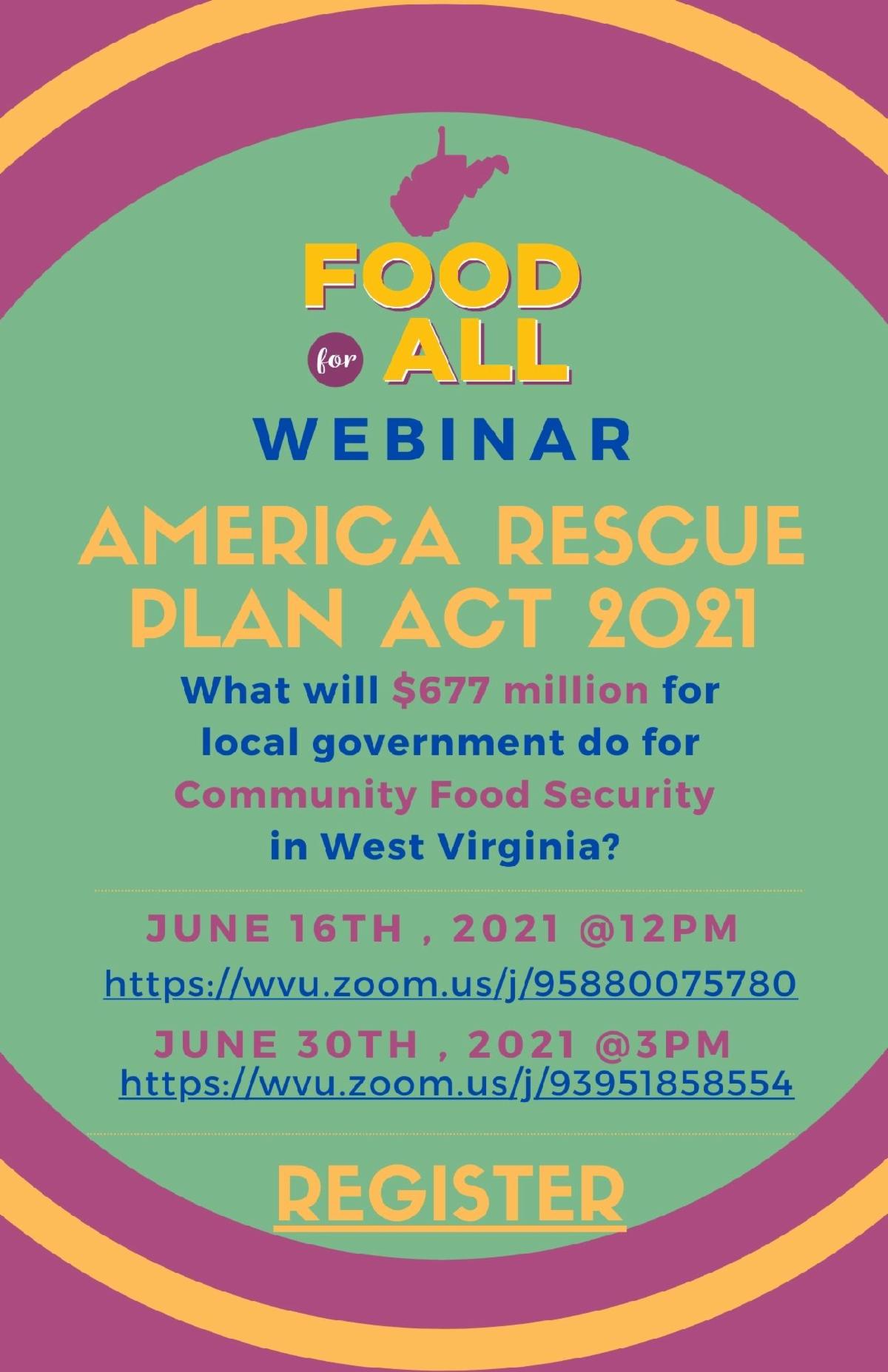
WVCBP’s new Elevating the Medicaid Enrollment Experience (EMEE) Voices Project seeks to collect stories from West Virginians who have struggled to access Medicaid across the state. Being conducted in partnership with West Virginians for Affordable Health Care, EMEE Voices will gather insight to inform which Medicaid barriers are most pertinent to West Virginians, specifically people of color. Existing data asserts that structural barriers and stigma impact Black and brown West Virginians’ interactions with the Medicaid program. However, more precise investigation is necessary for specifying these disparities and transforming them into meaningful policy choices. Overall, this project will synthesize quantitative data with the stories collected to provide a holistic understanding of Medicaid barriers. Addressing the obstacles West Virginians of color face will improve Medicaid for all West Virginians, contributing to a healthier state.
Do you have a Medicaid enrollment story to share? We’d appreciate your insight. If you are a Medicaid enrollee, please tell us about your experience here. If you are a Medicaid provider, please fill out our questionnaire here.
You can watch WVCBP’s health policy analyst Rhonda Rogombé and West Virginians for Affordable Health Care’s Mariah Plante further break down the new project and its goals in this FB Live.
You can find full project details on our webpage here.

The American Families Plan (AFP) is a historic opportunity to support the success of families and workers, and few places in the country will benefit as much as West Virginia – but only if the plan is passed.
Have you been impacted by lack of access to child care? We welcome you to share your experience with us by completing our survey. We’d appreciate your insight — responses will be used to help us show our leaders in Congress just how much the AFP would serve parents in the Mountain State.
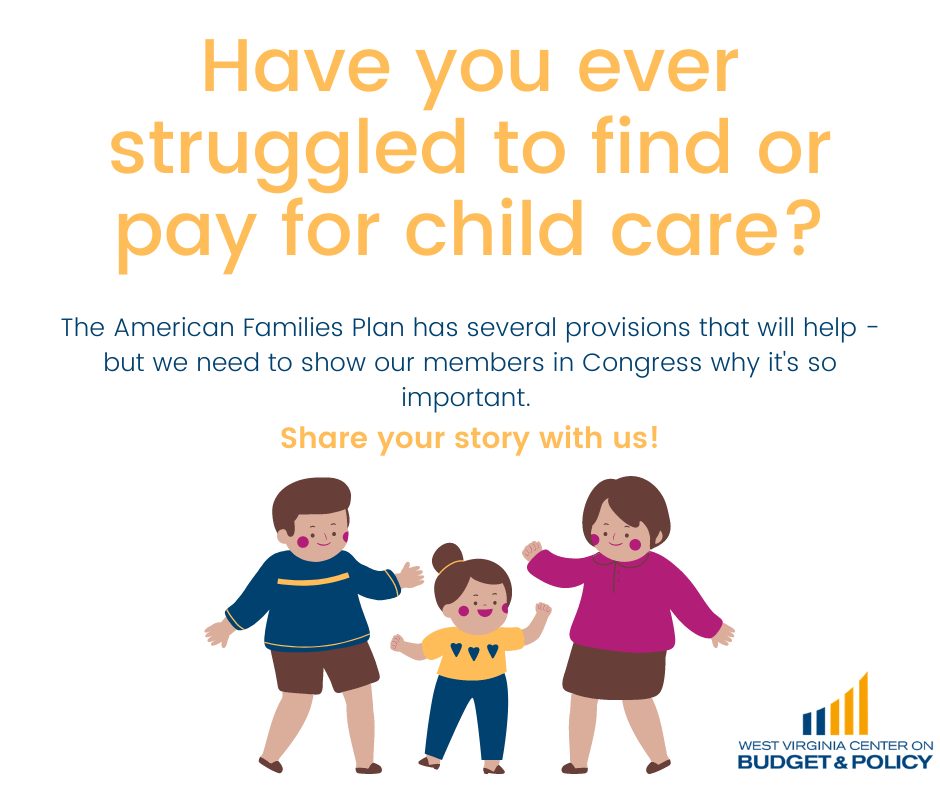
The Appalachia Prison Book Project is a West Virginia-based nonprofit that challenges mass incarceration through books, education, and community engagement. APBP sends free books to people imprisoned in six Appalachian states, hosts book clubs inside prisons in the region, and is leading an effort to bring for-credit college courses into prisons.
APBP is excited to announce that they are offering two $2,500 education scholarships for the 2021-2022 academic year. Each scholarship will be awarded to a person who has been released form a West Virginia Department of Corrections and Rehabilitation state prison or federal prison in WV and who will be beginning or continuing their undergraduate or graduate education at a college or university in WV. The applicant must have been released within three years of the application deadline.
You can find full scholarship details and instructions to apply here.

Paid Leave Works for WV (PLWWV) is a broad coalition of stakeholders focused on advocating for a robust paid family and medical leave policy that ensures no one has to choose between their job and caring for themselves or a loved one.
The coalition is looking to collect stories from across the Mountain State. If you and your family have benefited from paid leave or have struggled due to lack of access to paid leave, please share your story and help us advocate to make this policy available for all West Virginians. We encourage you to share the form with relevant friends and family members, too!
PLWWV has also begun a letter writing campaign to urge Senators Manchin and Capito to prioritize paid family and medical leave. You can send a letter here.
The WVCBP is a proud member of this new coalition. To stay up to date on the coalition’s work, follow them on Facebook, Twitter, and Instagram.
For more on the importance of paid leave and how it can help more women remain in the workforce, check out this recent article featuring insight from WVCBP executive director Kelly Allen.
